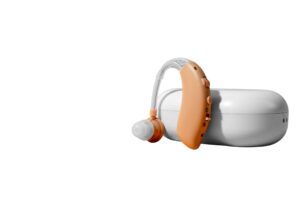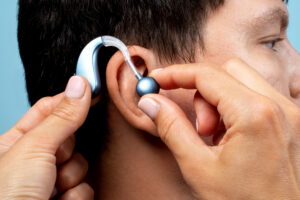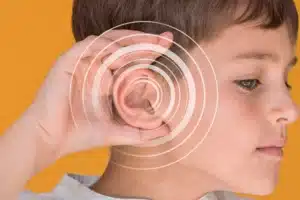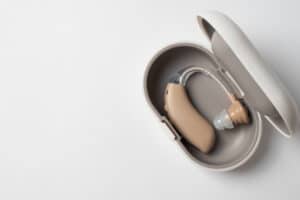When discussing hearing impairments, it’s essential to understand the terminology and distinctions used. Two of the most compared and frequently used terms are hard of hearing vs. deaf. Both terms relate to a person’s ability (or lack thereof) to perceive sound, but they convey different degrees and nuances of hearing loss.
In discovering hard of hearing vs. deaf, these distinctions are not merely about medical definitions but also encompass cultural identities, modes of communication, and personal experiences. So, what’s the difference between the two, and why is it significant to make a clear distinction?
What is the difference between deaf and hard of hearing?
Understanding the distinction between “deaf” and “hard of hearing” is crucial, as these terms don’t only represent different levels of hearing ability but also carry social, cultural, and personal significance for those who identify with them. Here’s a more in-depth look:
Deaf
- Degree of Hearing Loss: Typically refers to profound hearing loss, where individuals have very little to no hearing.
- Communication: Many deaf individuals use sign language as their primary mode of communication, though not all do. Some also rely on lip-reading or use written communication.
- Cultural Significance: There’s a strong and vibrant Deaf culture, particularly among those who use sign language. This culture encompasses art, history, and shared experiences of being deaf in a predominantly hearing world.
- Onset: Deafness can be present from birth or acquired later in life.
Hard of Hearing
- Degree of Hearing Loss: Encompasses a range from mild to severe hearing loss. Individuals with this kind of hearing loss can often perceive some sounds, but they might struggle with specific frequencies or volumes.
- Communication: Many hard-of-hearing individuals use hearing aids or other assistive listening devices to enhance their hearing capabilities. They may primarily rely on spoken language, though some might also use sign language to varying extents.
- Cultural Significance: While some hard-of-hearing individuals feel connected to the Deaf community, others might identify more with the hearing world or navigate a space in between.
- Onset: Like deafness, being hard of hearing can be congenital or acquired. Common causes for acquired cases include age, noise exposure, or certain medical conditions.
In essence, while hard of hearing vs. deaf both pertain to hearing impairments, they represent unique experiences and challenges. It’s vital to approach each term with respect and understanding, recognizing the depth and breadth of experiences they encompass.
Is it OK to say deaf or hard of hearing?
Both “deaf” and “hard of hearing” are accepted terms used by the hearing-impaired community. However, it’s crucial to respect individual preferences. Some might identify as “deaf” with a small ‘d’ indicating the condition, while others with a capital ‘D’ (Deaf) indicating a sense of community and cultural identity.
What are the characteristics of deaf and hard of hearing?
Deaf individuals:
- Often use sign language as their primary mode of communication.
- Might have been born with hearing impairment or lost it over time.
- Frequently involved in the Deaf community, sharing a unique culture and set of experiences.
Hard-of-hearing individuals:
- Typically experience difficulties in understanding speech, especially in noisy environments.
- Often use hearing aids or assistive listening devices.
- Might develop the condition over time, often due to age or exposure to loud noises.
For both groups of hard of hearing vs. deaf, tinnitus—a ringing or buzzing in the ears—can sometimes accompany hearing loss. It can be distressing, but if you’re seeking tinnitus treatment in Westchester, specialized options are available to help manage and alleviate the symptoms.
How do I know if I am hard of hearing?
If you find yourself constantly asking the question, “Am I hard of hearing?”, here are the symptoms of this hearing loss issue:
- Difficulty Following Conversations: If you frequently ask people to repeat themselves or find it challenging to understand words, especially against background noise or in a group of people, it’s a notable sign.
- Increased Volume: Consistently turning up the volume on your TV, radio, or music device beyond what others find comfortable can indicate hearing issues.
- Missed Auditory Cues: Not hearing every day sounds like the ringing of a phone, a doorbell, or an alarm can be concerning.
- Tinnitus: Experiencing a constant ringing, buzzing, or hissing sound in your ears, even when it’s quiet, is a symptom associated with hearing loss.
- Avoidance of Social Situations: If you find yourself avoiding social interactions or feeling more isolated because following conversations has become exhausting, it could be due to hearing challenges.
- Reliance on Lip Reading: Unconsciously reading lips to understand conversations better can be an adaptive strategy for those with hearing difficulties.
If these signs resonate with your experience, it’s essential not to ignore them. The best way to determine the extent of potential hearing loss is by getting a professional hearing test. For those who prefer a quick initial check from the comfort of their homes, an online hearing test provides a valuable preliminary assessment.
Tools and Resources for the Deaf and Hard of Hearing
Both the hard of hearing vs. deaf communities have a myriad of tools and resources available to enhance communication and improve daily life. Here are some notable mentions:

- Hearing Aids: Devices designed to amplify sound, assisting those who are hard of hearing. Modern hearing aids can be customized to an individual’s specific hearing loss profile.
- Cochlear Implants: A surgically implanted device that directly stimulates the auditory nerve, allowing some deaf individuals to perceive sounds.
- Assistive Listening Devices (ALDs): These include amplified telephones, TV listening systems, and personal amplifiers.
- Captioning: Real-time captioning services and closed captioning on TVs and videos can make auditory content accessible to the deaf and hard of hearing.
- Sign Language Classes: Learning sign language can be beneficial not just for the deaf but also for their friends, family, and community members.
- Tinnitus Management Tools: For those who experience tinnitus alongside their hearing loss, various tools and treatments can help manage symptoms.
- Support Groups and Organizations: Connecting with local or online support groups can provide emotional support and resources.
- Mobile Apps: Numerous apps have been developed for real-time speech-to-text transcription, sign language tutorials, and amplification.
Hard of Hearing Vs. Deaf
In conclusion, while the terms hard of hearing vs. deaf both pertain to hearing impairment, they signify different degrees and experiences of hearing loss. Regardless of the label, understanding and empathy from society, along with available resources and treatments, can make a profound difference in the lives of those with hearing challenges.
Take the Next Step with Listen Hear Diagnostics
Your hearing is personal and unique. At Listen Hear Diagnostics, we understand that which is why Dr. Esca and our team provide tailored audiology care for every individual. Proudly serving the Westchester community, our commitment is to ensure you experience clear, strain-free hearing. Whether you need a diagnostic evaluation, hearing impaired services, deaf and hard of hearing services, or hearing aids for hard of hearing, we’re here to guide you every step of the way.
📞 Connect with Us Today:
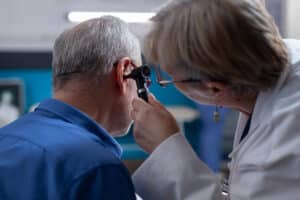
- Schedule an appointment by calling us at (914) 902-8845.
- Prefer to book online? Click here to schedule.
- For inquiries about our products, services, or practice, don’t hesitate to fill out our contact form.
Visit Us: 161 Central Park Ave, Hartsdale, NY 10530. Your journey to better hearing starts here.


